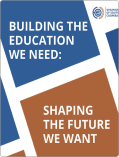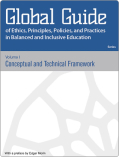Universal Declaration of Balanced and Inclusive Education (UDBIE)
Balanced and Inclusive Education is an approach to educational quality and inclusivity that is responsive to the cultural, ethical, and social dimensions of the learning process, rendering education fulfilling for the individual and intrinsically relevant to society. Proclaimed on 29 January 2020, the Universal Declaration of Balanced and Inclusive Education (UDBIE) paved the way for the creation of the OSC, to contribute to the construction of a third, equitable and inclusive way of development.
An Educational Transformation
- 15 Articles
- 15 Principles
- 15 Collective and Individual Rights
- 15 Educational Duties
- 30 Commitments to Transformation


International Cooperation
An integrative multi-perspective approach based upon interconnecting both academic as well as non-academic knowledge domains for a complex and holistic understanding of the world

29th January
BIE day
As January unfolds its peculiar nature, ushering in new beginnings and resolutions, the 29th of January emerges as a distinctive date on the calendar. The Organisation of Southern Cooperation (OSC) invites you to join the commemoration of the International Day of Balanced and Inclusive Education #BIEday.





